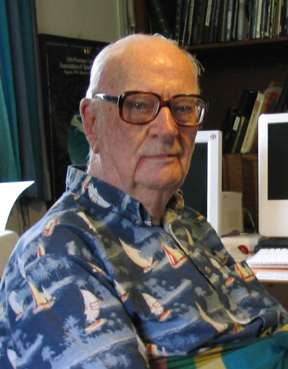“Now I understand,” said the last man.”
Source: Childhood's End
Sir Arthur Charles Clarke, CBE, FRAS was a British science fiction writer, science writer and futurist, inventor, undersea explorer, and television series host.
He is famous for being co-writer of the screenplay for the 1968 film 2001: A Space Odyssey, widely considered to be one of the most influential films of all time. Clarke was a science writer, who was both an avid populariser of space travel and a futurist of uncanny ability. On these subjects he wrote over a dozen books and many essays, which appeared in various popular magazines. In 1961 he was awarded the Kalinga Prize, an award which is given by UNESCO for popularizing science. These along with his science fiction writings eventually earned him the moniker "Prophet of the Space Age". His other science fiction writings earned him a number of Hugo and Nebula awards, which along with a large readership made him one of the towering figures of science fiction. For many years Clarke, Robert Heinlein and Isaac Asimov were known as the "Big Three" of science fiction.
Clarke was a lifelong proponent of space travel. In 1934, while still a teenager, he joined the British Interplanetary Society. In 1945, he proposed a satellite communication system, an idea which won him the Franklin Institute's Stuart Ballantine Medal in 1963, and other honours. Later he was the chairman of the British Interplanetary Society from 1946–47 and again in 1951–53.
Clarke emigrated from England to Sri Lanka in 1956, largely to pursue his interest in scuba diving. That year he discovered the underwater ruins of the ancient Koneswaram temple in Trincomalee. Clarke augmented his fame later on in the 1980s, from being the host of several television shows such as Arthur C. Clarke's Mysterious World. He lived in Sri Lanka until his death. He was knighted in 1998 and was awarded Sri Lanka's highest civil honour, Sri Lankabhimanya, in 2005.

“Now I understand,” said the last man.”
Source: Childhood's End
“The thing’s hollow—it goes on forever—and—oh my God!”
Source: 2001: A Space Odyssey
“I don't believe in God but I'm very interested in her.”
As quoted in Multiple Intelligences in Practice : Enhancing Self-esteem and Learning in the Classroom (2006) by Mike Fleetham, Section 2 : Using MI
2000s and attributed from posthumous publications
Source: 2001: A Space Odyssey
“… the newspapers of Utopia, he had long ago decided, would be terribly dull.”
Source: 2001: A Space Odyssey
As quoted in The Mammoth Book of Zingers, Quips, and One-Liners (2004) by Geoff Tibballs, p. 264
2000s and attributed from posthumous publications
Source: Profiles of the Future: An Inquiry into the Limits of the Possible
“Overhead, without any fuss, the stars were going out.”
1950s
Source: "The Nine Billion Names of God", 1953
“But he knew well enough that any man in the right circumstances could be dehumanised by panic.”
Source: 2001: A Space Odyssey
“Excessive interest in pathological behavior was itself pathological”
Source: 3001: The Final Odyssey
“Now I can rejoice that I knew you, rather than mourn because I lost you.”
Source: The Songs Of Distant Earth
Source: The Fountains of Paradise (1979), Chapter 16 “Conversations with Starglider” (p. 95)
Source: 1970s, Chapter 3 (The Future of Transport) in Profiles of the Future (7th printing, 1972)
“Even though you were once a goddess, Kalidasa’s heaven was only an illusion.”
Source: The Fountains of Paradise (1979), Chapter 11 “The Silent Princess” (p. 67)
“Human judges can show mercy. But against the laws of nature, there is no appeal.”
"Sir Arthur's Quotations" http://www.clarkefoundation.org/about-sir-arthur/sir-arthurs-quotations/, The Arthur C. Clarke Foundation.
Disputed
Source: The Light of Other Days (2000), Chapter 26
“If children have interests then education happens.”
As quoted in Ted Talk "The child-driven education" http://www.ted.com/talks/sugata_mitra_the_child_driven_education.html by Sugata Mitra (2012)
2000s and attributed from posthumous publications
Source: The City and the Stars (1956), Chapter 5 (p. 33)
The Exploration of Space (1951)
1950s
As quoted in "Humanity will survive information deluge — Sir Arthur C Clarke" in OneWorld South Asia (5 December 2003) http://southasia.oneworld.net/article/view/74591/1
2000s and attributed from posthumous publications
Voices from the Sky : Previews of the Coming Space Age (1967)
1960s
Source: The Fountains of Paradise (1979), Chapter 2 “The Engineer” (p. 10)
“It is later than you think. May it not be true for this Sundial.”
Inscription for a Sundial at the University of Moratuwa Sri Lanka (1996) http://www.ent.mrt.ac.lk/~rohan/career/projects/sundial/sundial.html
1990s
Source: The Light of Other Days (2000), Chapter 19
Profiles of the Future (1962)
1960s
Source: The City and the Stars (1956), Chapter 13 (p. 100)
Presidents, Experts, and Asteroids, essay for journal Science, pp 1532-3 (5 June 1998)
1990s
The Odyssey File (1984), also quoted in The Mammoth Book of Zingers, Quips, and One-Liners (2004) by Geoff Tibballs, p. 128
1980s
Source: The City and the Stars (1956), Chapter 13 (p. 99)
“There is hopeful symbolism in the fact that flags do not wave in a vacuum.”
As quoted in Values of the Wise : Humanity's Highest Aspirations (2004) by Jason Merchey, p. 31
2000s and attributed from posthumous publications
“He had discharged his destiny; now, perhaps, he could begin to live.”
Source: The City and the Stars (1956), Chapter 25 (p. 187)
Source: The Light of Other Days (2000), Chapter 4
“There was no substitute for reality; one should be aware of imitations.”
Source: The Fountains of Paradise (1979), Chapter 23 “Moondozer” (p. 129)
Seti@Home Donor List (2006) http://setiathome.berkeley.edu/donorlist.php
2000s and attributed from posthumous publications
The Exploration of Space (1951), p. 187
1950s
Source: The Light of Other Days (2000), Chapter 19
Source: The Fountains of Paradise (1979), Chapter 16 “Conversations with Starglider” (p. 94)
Space and the Spirit of Man (1965)
Source: The Light of Other Days (2000), Chapter 6
“Clarke's Fourth Law: For every expert there is an equal and opposite expert.”
Profiles of the Future (1999, London: Victor Gollancz) p. 143
On Clarke's Laws